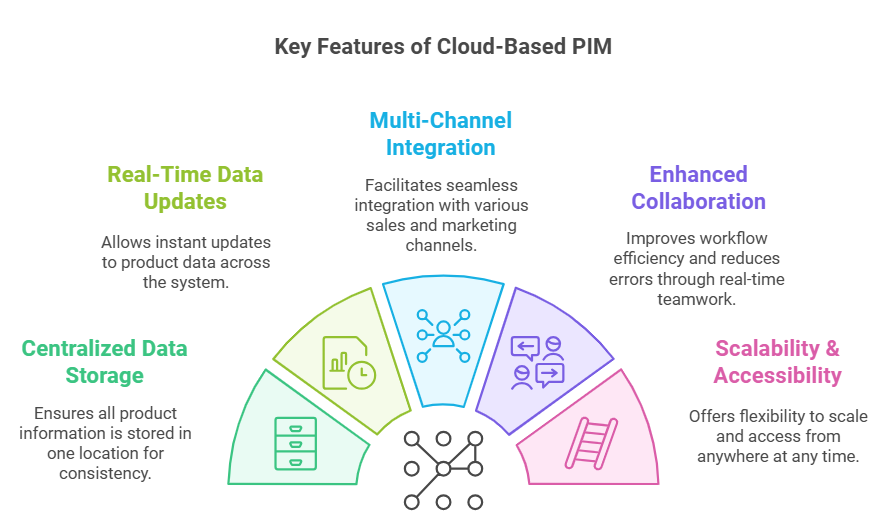How Cloud Based PIM Enhances Collaboration Across Global Teams

In today’s fast-paced global market, teams need to collaborate effectively across borders. Cloud-based Product Information Management (PIM) systems have emerged as essential tools for streamlining product data while fostering seamless team collaboration. This post will explore how these systems drive communication, coordination, and innovation among global teams.
What Is a Cloud-Based PIM?
A cloud-based PIM system centralizes product data, making it accessible to teams across the globe. Unlike traditional systems that rely on local servers, cloud-based solutions offer better flexibility, scalability, and accessibility. This centralized approach ensures consistency and accuracy across all teams and channels.
Overcoming the Challenges of Global Team Collaboration
Global teams face numerous obstacles that hinder their collaboration. These include:
- Managing Supplier Data: Coordinating product information from multiple suppliers can lead to delays and inaccuracies.
- Data Silos: Separate systems for different locations may create isolated data, making communication difficult.
- Version Control Issues: Without a centralized system, ensuring all teams are aligned on the latest data becomes challenging.
- Language and Localization Barriers: Managing product content across multiple languages requires effective communication to ensure compliance with regional requirements.
- Time Zone Differences: Coordinating real-time updates becomes harder when teams work across different time zones.
Cloud-based PIM systems address these issues by centralizing data and enabling real-time updates, which ensures consistency and smooth communication.

How Cloud-Based PIM Enhances Team Collaboration
- Centralized Data Management: By centralizing product data, cloud-based PIM systems ensure that all team members access the same up-to-date information, eliminating discrepancies and improving decision-making.
- Instant Updates: Real-time data sharing helps teams across different locations work with the latest information, reducing the chances of miscommunication.
- Integrated Communication Tools: Many cloud-based PIM systems come with chat features and project management tools, enabling direct discussions and efficient tracking of tasks.
Use Cases for Cloud-Based PIM
Cloud-based PIM enhances collaboration in various ways:
- Global Product Launches: For successful launches across multiple regions, teams can share and update product information in real-time.
- Cross-Functional Collaboration: R&D, design, and production teams can collaborate more effectively by sharing specifications and product updates in one platform.
- International Campaigns: Marketers can rely on accurate product data to create consistent materials and localize content for various markets.
Addressing Common Challenges
- Security and Compliance: These systems offer encryption and access controls to protect data and ensure compliance with regulations like GDPR and CCPA.
- Seamless Integration: These platforms integrate easily with existing systems such as ERP and CRM, reducing manual data entry and streamlining workflows.
- Training and Adoption: Proper training is essential for team members to fully adopt the system and utilize its full range of features.
The Role of Cloud-Based PIM in Future Remote Work
As remote work and global teams continue to grow, cloud-based PIM systems will become even more essential. Future advancements will likely include enhanced tools for project management, communication, and user experience, making these systems indispensable for seamless team collaboration.
Benefits Beyond Collaboration: Product Quality and Customer Satisfaction
In addition to fostering collaboration, cloud-based PIM systems also enhance product quality and customer satisfaction. By centralizing and updating product data, businesses can avoid errors and inconsistencies, leading to better customer experiences and fewer returns. Additionally, cloud-based PIM enables consistent, up-to-date information across all customer touchpoints, ensuring that marketing and sales teams provide accurate details to consumers.
Improving Supply Chain Efficiency
Cloud-based PIM systems improve supply chain management by providing quick access to detailed product specs, pricing, and inventory levels. This leads to optimized inventory management, better forecasting, and faster response times to market changes.
Conclusion
Cloud-based PIM systems play a crucial role in enhancing collaboration across global teams. They streamline data management, facilitate real-time sharing, and offer tools for better communication. These systems help businesses overcome challenges like time zone differences and data silos, leading to greater efficiency and innovation.
Bluemeteor Product Content Cloud is a cloud-based solution designed to streamline data management for global teams. It enhances collaboration, ensures consistency, and drives efficiency.
👉 Request a Demo Today to see how Bluemeteor Product Content Cloud can transform your operations.
Related Articles
Recent Post
Categories




